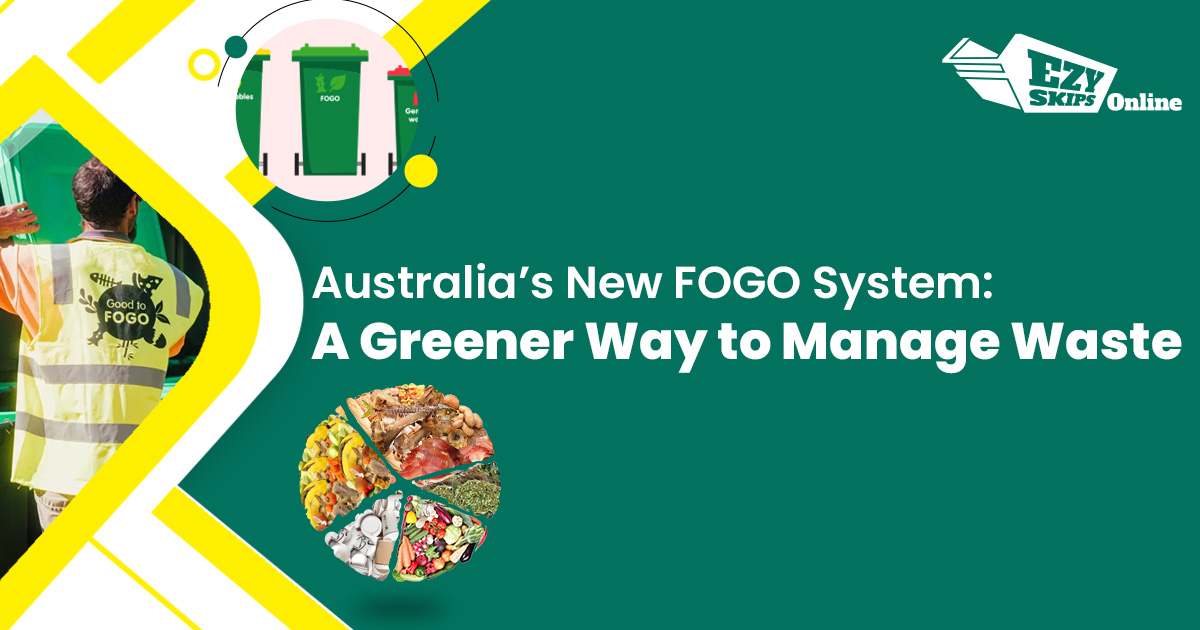
Australia is stepping up its waste management game with the Food Organics and Garden Organics (FOGO) system, a new way to handle waste focused on separating food scraps and garden waste. FOGO is rolling out across many regions in 2024, and it aims to reduce the amount of waste going to landfills by introducing a dedicated third bin for organics.
This system not only helps the environment by cutting greenhouse gases but also allows communities to create compost, which can improve soil health and boost recycling efforts.
What Is the FOGO System and How Does It Work?
The FOGO system is a simple yet effective way to manage waste. It introduces a third bin specifically for organic waste, which includes:
- Food scraps
- Garden clippings
- Small prunings
By sorting out these materials, we keep them from ending up in landfills, where they release methane – a powerful greenhouse gas that contributes to climate change. Instead, the organic waste collected in the FOGO bin can be turned into compost, which can then be used to enrich soil in gardens, parks, and farms.
How FOGO Is Rolling Out Across Australia
Different parts of Australia are adopting the FOGO system at different speeds, but the momentum is building fast. Here’s a quick look at how some states are bringing FOGO to their communities.
Western Australia
Western Australia is a leader in FOGO adoption, especially in the Perth and Peel regions. The State Government has set a goal for all local councils in these areas to have FOGO in place by 2025.
The City of Kalamunda is preparing to launch its FOGO service in September-October 2024, as part of a state-wide push supported by the $20 million Better Bins Plus: Go FOGO program. This funding helps local councils switch to the three-bin system, making it easier for households to sort their waste.
So far, 250,000 households in Western Australia already have access to FOGO, and more councils are expected to implement it by June 2026.
Australian Capital Territory (ACT)
The ACT has been testing the FOGO system since November 2021 with a pilot program. This year, they’re expanding the program to cover 1,150 more households in multi-unit buildings in Belconnen and Tuggeranong.
The aim is to collect food and garden waste more effectively, diverting it from landfills and helping the ACT work toward a circular economy. By creating compost from food and garden scraps, the ACT also reduces greenhouse gas emissions and supports local agriculture.
New South Wales (NSW)
In New South Wales, the government is encouraging councils to adopt FOGO with a third round of Go FOGO grants, part of a $46 million program. These grants help cover the cost of things like bins and kitchen caddies, giving councils up to $50 per household to make the transition easier.
Right now, nearly half of NSW’s councils are either using or planning to start FOGO services, and the state is considering making it mandatory in the future.
Why FOGO Matters: The Benefits
The FOGO system has several clear benefits. Firstly, it reduces the amount of waste going to landfill, which is great for the environment.
By keeping organic waste out of landfills, we’re cutting down on methane emissions, which contribute to climate change. Secondly, FOGO helps create compost, which is an excellent way to improve soil quality and support plant growth.
It’s estimated that up to 66% of household waste can be processed through FOGO, which means we can potentially recover and reuse a significant portion of what we throw away.
Getting Involved with FOGO
As FOGO continues to roll out, community involvement and education will play a big role in making it successful. If FOGO is coming to your area, make sure you know what can and can’t go in the FOGO bin.
Typical items for FOGO bins include:
- Fruit and vegetable scraps
- Coffee grounds
- Tea bags
- Lawn clippings
- Small branches
However, things like plastics, metals, and chemicals should stay out, as they contaminate the compost.
A Brighter, Cleaner Future with FOGO
Australia’s transition to the FOGO system is an exciting step toward a cleaner, greener future. By embracing this new way of sorting waste, we’re helping reduce landfill waste, improve recycling, and support sustainable practices.
As more regions across the country introduce FOGO, communities can look forward to practical solutions that make a real difference for the environment. For example, using services like skip bins Rockingham with Ezyskips Online makes it easier to manage waste sustainably, turning what we throw away into resources that benefit our gardens and the planet.
This is a community effort, and as FOGO rolls out across Australia, it’s a chance for everyone to do their part in creating a healthier and more sustainable world – contact us for a free consultation to see how you can get involved.

